Episodes
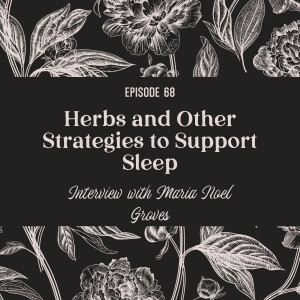
Tuesday Apr 02, 2024
Tuesday Apr 02, 2024
In today's episode, I'm delighted to interview Maria Noël Groves about her new book, Herbal Remedies for Sleep, and how the book applies to our work as clinicians. Listen in for thoughts on nervines, when to refer out v. when to try DIY or gentle sleep support, distinguishing between 'gentle' and 'strong,' and more.
Links to Maria's work & website
Buy Herbal Remedies for Sleep (and get 10% off of any of Maria's classes/class series) and a bonus online sleep course
Follow Maria on Instagram
Learn from Maria and sign up for her newsletter at Wintergreen Botanicals
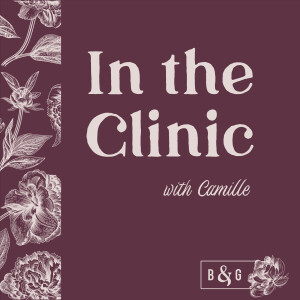
Tuesday Aug 08, 2023
Tuesday Aug 08, 2023
This week, I had the pleasure of interviewing Ember Peters, Stascha Stahl, and Vilde Chaya Fenster-Ehrlich about their upcoming Advanced Clinical Herbal Skills program.
The program looks awesome. I'd like to take it, and I probably would if my fall wasn't so chaotic.
Whether you're interested in furthering your clinical skills or not, though, I encourage you to listen to the episode (or read the transcript linked below) for the discussion about what it takes to create spaces where healing is possible for people from oppressed and overlooked communities.
It's more work than most of us realize when we're starting out as practitioners.
We need to constantly examine/reexamine our own assumptions and practices in order to become better at the work we do.
It's hard to do this alone. Being part of programs and showing up in spaces where others are engaged in this type of work speeds up the process and makes it possible to see things in ways that weren't accessible to you before.
Whether you join a program like this or not, I think listening to this conversation will serve as an important call to continue your growth as a person and as a practitioner.
I left this conversation feeling inspired. I hope you do, too.
Warmly,
Camille
Resources
You can learn more about Ember on their website: Wild Current Herbalism or connect with Ember via Instagram
You can learn more about Stascha on their website: Bay Area Herbalist or connect with Stascha via Instagram
You can learn more about Vilde on her website: Wild Cherries or connect with Vilde via Instagram
Learn more about the Advanced Clinical Herbal Skills Program
Leave a question for Camille to answer on the podcast: https://intheclinic.com
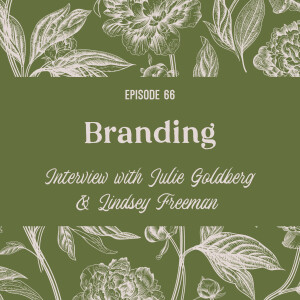
Tuesday Jul 25, 2023
Tuesday Jul 25, 2023
Branding and Website Design Isn't Easy
Many practitioners spend a lot of time, energy, and sometimes money trying to cobble together a website and professional brand as they're just starting out.
This isn't usually the best choice.
You do want to have a brand, but it's also important to understand that your practice will evolve in unexpected ways over the first few years.
If you spend a lot of money creating a brand and website before you've seen many clients, you'll likely need to change it all later.
You want to be spending your time finding clients, getting the foundations of your practice set up, and actually working with clients, rather than stressing over building the perfect website yourself.
In this episode, brand designer Lindsey Freeman (no relation!) and therapist Julie Goldberg share more about the website templates and other resources they've created specifically for service providers, as well as tips on branding and getting started with your practice.
I highly recommend starting from a template if you're experiencing website anxiety or if you're finding that creating your website is holding up your practice.
It's affordable, it's easy (or at least easier!), and you'll be able to move on to the many other things that need to happen to get your doors open.
Resources
Learn more about Julie & Lindsey + view their templates and other resources on their website: Premade (use code BLOOM for 15% off 🌻) and don't forget to check out their free Brand Therapy Guide (note that these links are no longer working 🙁)
Connect with Julie & Lindsey via Instagram
Previous "In the Clinic" episode on website perfectionism
Research other brands you like, and use them as inspiration for look & feel, colors, photography, and language. Everything you’re interested in is a reflection of you.
Canva
Adobe Color has premade color templates put together
Pinterest
Typewolf, type combinations
--- Send in a voice message: https://intheclinic.com
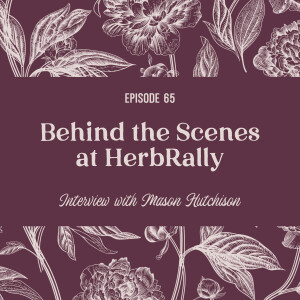
Friday Jul 14, 2023
Friday Jul 14, 2023
I was so excited to interview Mason Hutchinson, the founder of HerbRally. Herb Rally is a platform for herbalists and herbal enthusiasts, including event listings, a podcast, and a YouTube channel.
Mason shared talked to us about the origins of HerbRally, from its humble beginnings as an event listing website to its expansion into the robust platform that we see now, including monographs, a daily podcast, a YouTube channel, and the HerbRally Schoolhouse membership area.
He discusses the challenges of work-life balance and financial pressures while giving us some insight into how he and Amanda, his wife and business partner, approach marketing and promotion with an emphasis on authenticity and service to the community.
There's a lot to learn from this "behind the scenes" interview, whether you're just starting your own herbal business or whether you're a bit farther down the road.
Resources Mentioned
You can learn more about Mason on his website: HerbRally. Here's the list of virtual events or search by state for in-person events. Here's the HerbRally list of online herbal schools, or you can Submit your events to HerbRally
Connect with Mason on Instagram, Facebook, and YouTube
The marketing resources Mason mentioned: Colin & Sameer, Nick Nimman, Noah Kagan Presents podcast
In the Clinic episodes on my email list experiment & on the power of showing up
--- Send in a voice message: https://intheclinic.com
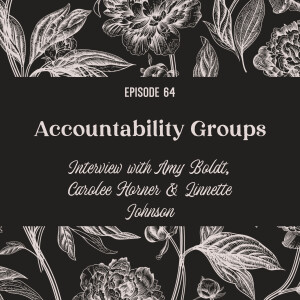
Monday Jul 10, 2023
Monday Jul 10, 2023
In this episode, I'm joined by Carolee Horner, Linnette Johnson, and Amy Boldt, who share their experiences with forming and attending an accountability group over several years. They highlight the value of accountability groups, emphasizing how they provide support, inspiration, and a sense of community for practitioners. In this episode, you'll learn more about how accountability groups have helped them overcome challenges, redefine success, and grow both personally and professionally.
As you may know, I'm a huge fan of accountability groups. They're helpful at any stage of your career, and I truly encourage you to explore different groups and find one that resonates with your needs - or start one, if you can't find one that suits you.
Amy Boldt
Amy is a clinical herbalist and herb farmer from Westminster, MD; her practice specializes in sleep and anxiety-related disorders. She is also a registered yoga teacher and Reiki practitioner, which assist in helping her clients find relief. Amy grows many of the herbs that she uses with clients on her farm, which focuses on sustainability and protecting at-risk native medicinal plants.
Amy attended the Maryland University of Integrative Health and graduated in 2014 with a Master of Science in Therapeutic Herbalism. She loves teaching workshops, guiding plant walks, and getting out in the woods to reconnect with nature. Her farm is on the United Plant Savers's registry as a botanical sanctuary, so when she's not working with clients she is maintaining her forest farm and homestead.
You can learn more about Amy on her website: The Wild Woman Medicine
Connect with Amy via her private Facebook group for women called Herbs for Rest and Relief: A Women's Group
Carolee Horner
Carolee Horner is a functional nutritionist and health coach in Atlanta, GA. She works with people with Parkinson's and their care partners to reverse symptoms and slow progression. She utilizes holistic approaches to promote gut and brain health that work for the entire family.
She has been awarded a Master's degree in Integrative Nutrition from Maryland University of Integrative Health and is a nationally board certified health and wellness coach. She is a member of the Advisory Council for The Center for Movement Challenges, a non-profit promoting holistic approaches to Parkinson's disease, with a special emphasis on boxing.
When she's not in the clinic or teaching, she enjoys being mom to 2 incredible kids, cooking, camping, and gardening. Laughter is her medicine.
You can learn more about Carolee on her website: Carolee Horner
Linnette Johnson
I am the founder of 5 Elements Coaching and a Clinical Nutritionist + Coach for mental health. I am passionate about supporting adults with sobriety, depression, and anxiety, along with relieving fatigue, skin issues, and body aches & pains associated with mental health through healthy eating and developing a better relationship with food, mind, and body.
Throughout the years, my business has grown, but my focus has always remained consistent; helping and supporting people through body-positive weight-neutral restorative therapies.
You can learn more about Linnette on her website: 5 Elements Coaching
Connect with Linnette via Instagram,
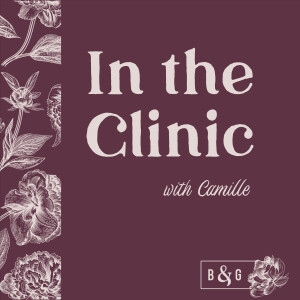
Tuesday Jul 04, 2023
Tuesday Jul 04, 2023
In this episode, herbalist Gina Badger joins us to discuss their experience of burnout and some strategies they've put in place to provide a bit of breathing room. Systematizing and automating processes, revamping communication policies, and clarifying language in intake forms and cancellation policies helped create more room and attend to bigger things. Gina also highlights the importance of prioritizing time and energy, as spending excessive time on emails can contribute to burnout. Towards the end of the episode, Gina shares about their upcoming offering for care workers, which includes short appointments spaced a month apart and a herbal formula to support recovery.
About Gina Badger
Gina Badger is a clinical energetic herbalist who offers care through their multidisciplinary clinic, Long Spell. Their lifework is contributing to a collective vision of holistic health care that’s equally heartfelt and irreverent, down-to-earth and visionary, gentle and rigorous.
Gina's primary herb teachers are Karyn Sanders and Sarah Holmes of the Blue Otter School of Herbal Medicine and Colleen Emery. Before pursuing herbalism as a career, they worked as a visual artist and editor for over a decade, having earned an MSc in Visual Studies from MIT (2010) and a BFA in Studio Art and Art History from Concordia University (2008).
Gina is a nonbinary femme of mixed Western European ancestry born in Treaty 6 territory and currently living on the unceded territories of the Musqueam, Squamish and Tsleil-Waututh nations (Vancouver, Canada). You can find Gina at https://longspell.com or on Instagram: @longspellclinic
--- Send in a voice message: https://intheclinic.com
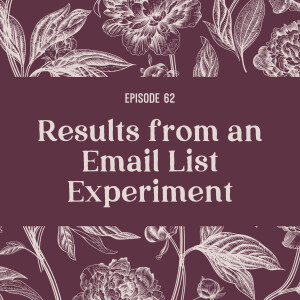
Sunday Jun 04, 2023
Sunday Jun 04, 2023
What happens if you don't have an opt-in offer?
Today, I want to talk about an experiment I've been running with my email list.
My email list is absolutely critical to the way I run my practice. It is my primary marketing tool, the way I stay connected with current, past, and potential clients. It's also a way for me to serve the practitioner community in general.
As you can imagine, inviting people to sign up for my email list is important to me.
Traditionally, the advice has been to offer a freebie or opt-in incentive in exchange for an email address. And I followed that advice for a long time.
Over the years, I started feeling less and less comfortable with it. I didn't want to manipulate people into signing up for my list. I wanted them to genuinely want to hear from me and be interested in what I had to offer.
So, last fall, I decided to try something different. I took all of my freebies and made them available on my website, no email address needed. And, instead of offering a freebie in exchange for an email address, I now invite people to sign up for my weekly practitioner notes if they want them.
It's working just as well. In fact, I've been getting more sign-ups than before (which may or may not be related to this particular change...).
The message here isn't that this is the right way to do things or that you should/should not have a freebie for your email list. Your audience may be different, and you may choose to one or more incentives to get them to sign up.
But, it's worth thinking about.
Do you need an opt-in offer? Do you want one?
Are you clearly articulating the reasons someone might want to be on your email list? Are you following through on those promises? And, how can you make all of this clear when you're inviting someone to sign up?
A bit of food for thought as you ponder your own email list & how you invite folks to sign up for it.
If you're looking to devote some time and energy to your email list in the upcoming months, stay tuned.
I'm planning a few fun events/courses that relate to email newsletters over the next few months 🤩
Helpful Links for Practitioners
Monday Mentoring 🌻
Camille's Weekly Practitioner Notes 💌
Herbal Observation Groups 🔍
2023 Hormone Deep Dive 🍒
Practitioner Resource page 🔦
Freebies 🎁
-- Leave a voice message for Camille: https://www.intheclinic.com
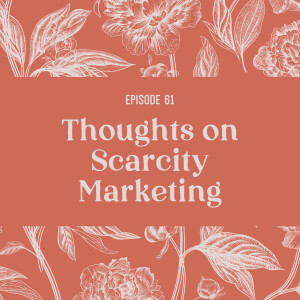
Monday May 22, 2023
Monday May 22, 2023
If you're new to clinical practice, you might be tempted to investigate common marketing techniques to help you find more clients.
Unfortunately, many of the strategies you'll hear about won't necessarily get you the kinds of results you're looking for.
In this episode, I share a story about a marketing expert who recommended working scarcity into your marketing to fill up your one-on-one practice. In this case, someone I know wound up saying they had only have a limited number of spots available, even that wasn't the case.
While this might seem like a reasonable way to encourage people to sign up, it's not a good foundation to build from.
Starting a relationship with deception is never a good idea. You don't want to build your relationship with a new client on a lie, even if the client will never know the truth.
Secondly, pushing people to sign up when they're not ready can cause a natural pushback, which can lead to them feeling manipulated or skeptical.
Even if they do decide to work with you, they're entering the relationship in a different position than if they had made the decision on their own.
Instead of pushing people, give them the space and let them know the options for working with you, including when and how they can sign up when they're ready.
It might take longer to build your practice this way, but winding up with a practice build on solid values and strong relationships is worth it.
If you feel that deadlines are helpful for your clientele, play around with how you can incorporate them authentically, without making it feel like it's their last opportunity to work with you or that they'll be missing out if they don't sign up now.
I hope these ideas are helpful as you plan out how to find new clients for your practice
Related episode: 47 | On Having Another Job
Helpful Links for Practitioners
Monday Mentoring 🌻
Camille's Weekly Practitioner Notes 💌
Herbal Observation Groups 🔍
2023 Hormone Deep Dive 🍒
Practitioner Resource page 🔦
Freebies 🎁
--- Send in a voice message: https://intheclinic.com
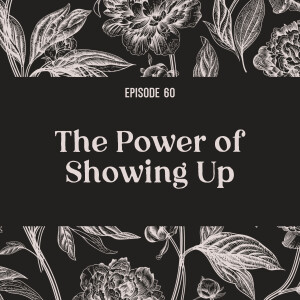
Sunday Apr 23, 2023
Sunday Apr 23, 2023
Why bother to show up when you can watch the recording?
Today, I'm sharing a simple yet often overlooked strategy for building your visibility and relationships within your community.
Finding clients and getting the word out about your practice can be a real challenge, especially when you're just starting out. It's easy to find yourself stressing over sending cold outreach emails to other practitioners or spending lots of time on social media in the hopes of building your referral network.
But there's another option that can make a huge difference: just show up for programs and classes that you're already interested in or signed up for.
What do I mean by "just show up"?
Here's an example:
If you sign up for a training or a webinar, don't just watch the recording later on at 2x speed. (Yes, I am guilty of this sometimes myself 😂).
Show up to the live sessions and participate actively in the chat or forum. Turn your camera on if you can. Engage with the presenter and/or the other attendees. Ask questions, share your thoughts and ideas, and be visible.
Instead of thinking of this merely as a way to obtain information or knowledge, understand that it is also an opportunity to build community.
When you are actively present at these kinds of events, you start to become known as an individual. People can get a sense for who you are, how you engage with people, and what work you do. When they feel comfortable with you, they are more likely to work with you personally and to refer clients who are a good fit.
But Camille, I'm too busy! I can't show up live.
Of course. I get it. You can't show up to everything.
Here's my advice: choose wisely and don't sign up for 100 things.
Only sign up for the things you're truly interested in and know you can make time for. Put them in your calendar and make them a priority. And when you do show up, be present and engaged.
Here's something you can do even if you can't attend live (or when there isn't a live option):
This is an easy one that surprisingly few people do: follow-up.
After the session or training, send a thank-you email to the presenter or other attendees you connected with. Take the initiative to stay in touch periodically.
This same idea applies for non-event situations. If someone's newsletter is a bright spot in your day, hit reply and let them know. Podcast episode blew you away? Leave a 5-star review. Cool YouTube video that answered your question perfectly? Give it a thumbs up and leave a kind comment. Using what you learned from a specific teacher every day? Email them to say hi and thank them, even if it's been 15 years.
You can easily make someone's day by doing these things, and it really does go a long way toward building relationships and community, which are at the core of a thriving practice.
The short version
Your presence matters. Signing up for classes, events, newsletters, videos, etc is not only about extracting information but also presents an opportunity to build relationships. Use it.
-- Leave a message for Camille: https://intheclinic.com
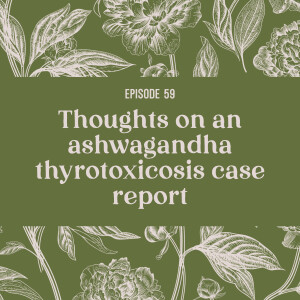
Sunday Apr 02, 2023
Sunday Apr 02, 2023
As I was preparing for a lecture on ashwagandha (Withania somnifera), I came across a case report sharing information about a women who went to the ER with tachycardia, palpitations and other symptoms of hyperthyroidism.
Her TSH was almost absent, while T4 and T3 were within normal limits. The doctors there ruled out other causes and eventually determined that she had been taking ashwagandha root extract daily instead of her regular thyroid medication for approximately 2 years after a diagnosis of hypothyroidism. They suspected this might be causing her hyperthyroid symptoms.
She was asked to discontinue the ashwagandha root, and at two follow-ups her TSH began to rise, while her T3 and T4 started dropping, suggesting a return to her hypothyroid state. The physicians suspected that she was in the early stages of hyperthyroidism when she presented in the ER, due to her T3 and T4 being WNL.
Here is a copy of the case (open access!) if you'd like to check it out: Kamal HI, Patel K, Brdak A, Heffernan J, Ahmad N. Ashwagandha as a Unique Cause of Thyrotoxicosis Presenting With Supraventricular Tachycardia. Cureus. 2022 Mar 25;14(3):e23494. doi: 10.7759/cureus.23494. PMID: 35475098; PMCID: PMC9035336.
In this episode, I discuss what we can learn from this case report, and what I wish the authors had included in their case presentation.
I hope you find this discussion helpful. If you have thoughts or clinical observations regarding ashwagandha and thyroid disease, I'd love to hear them!
--- Send in a voice message: https://intheclinic.com







